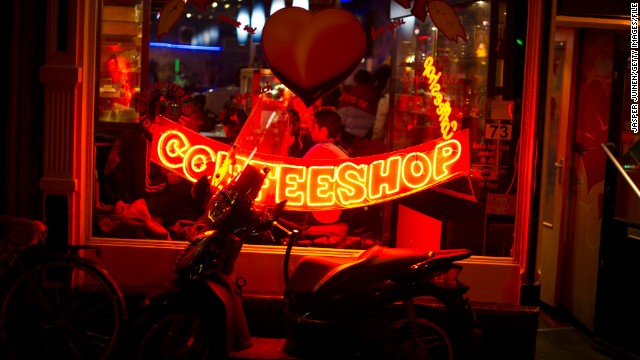(CNN) — When international tourists finally return to the canal-lined historic streets of Amsterdam, one of the city’s main attractions might be off limits.
Amsterdam mayor Femke Halsema has proposed a new policy that would ban foreign visitors from accessing the city’s coffee shops.
There are 166 cannabis coffee shops in Amsterdam, accounting for almost 30% of the Netherlands’ coffee shops.
In a letter to councilors on January 8, Halsema proposed introducing the “resident criterion” — a policy that permits only locals to use coffee shops — with the goal of making tourism in the city more manageable and to control the coffee shop supply chain.
Halsema will discuss the measures with Amsterdam’s city council later this month.
In line with Covid-19 lockdown measures, non-essential shops, including coffee shops, are currently closed in Amsterdam, although coffee shops are able to do takeout and delivery.
Cannabis in the Netherlands

Conversations around restricting access to Amsterdam coffee shops are not new.
Jasper Juinen/Getty Images/File
Different municipalities in the Netherlands have different coffee shop rules, and discussions on barring everyone except Dutch residents are not new.
Today, this rule still exists in Maastricht, in the south of the country.
To add to the slightly confusing setup, buying cannabis from a coffee shop is legal in the Netherlands, but producing cannabis remains illegal.
Back in July 2019, Halsema wrote to councilors saying the city’s coffee shops can put “the quality of life in the city center under pressure.”
In this survey, referenced in Halsema’s most recent correspondence, over half of those surveyed said they chose to visit the Dutch capital because they wanted to experience a cannabis cafe.
The results were that 34% indicated they’d come to Amsterdam less often if they weren’t able to visit coffee shops, and 11% said they wouldn’t come at all.
The survey also looked into whether adding an entry fee for visits to the Wallen/Singel areas — the medieval city center that constitutes the Red Light District — would bring tourist numbers down.
But the report suggested the city’s coffee shops have a stronger appeal for international tourists than the Red Light District.
Only 1% of those surveyed mentioned window prostitution as the main reason for their visit, while, 72% said they’d visited a coffee shop during their stint in Amsterdam.
Drug trade concerns
In her recent letter, Falsema also noted concerns about the city’s coffee shops supply chain.
The police, she added, are worried about links to the hard drugs trade.
The January 8 letter sets out three steps for forging ahead with a new policy — focusing on local regulation of the cannabis market by setting up an Amsterdam coffee shop brand, limiting the ability for coffee shops to become chains and preventing visitors from outside the Netherlands’ to enter coffee shops.
Falsema notes that a side effect of these new measures could be a shift towards the illegal cannabis market, but she expects that to be temporary.
Continued appeal of Amsterdam

Walking and cycling around the city of Amsterdam remains one of the main drawers for visitors.
Dean Mouhtaropoulos/Getty Images
While Amsterdam’s 2019 tourist survey suggested coffee shops have a strong appeal for visitors, those surveyed said the most common reason for visiting Amsterdam isn’t the coffee shops, the Red Light District or even the city’s museums and cultural attractions.
Instead, visitors championed the pretty wholesome appeal of walking or cycling around the city.
“I don’t think the banning of cannabis would decimate tourism,” said Claydon. “The city is also known for its culture and brilliant aesthetic.”
You may also like
-
UK coronavirus variant has been reported in 86 countries, WHO says
-
NASA technology can help save whale sharks says Australian marine biologist and ECOCEAN founder, Brad Norman
-
California Twentynine Palms: Explosives are missing from the nation’s largest Marine Corps base and an investigation is underway
-
Trump unhappy with his impeachment attorney’s performance, sources say
-
Lunar New Year 2021: Ushering in the Year of the Ox

